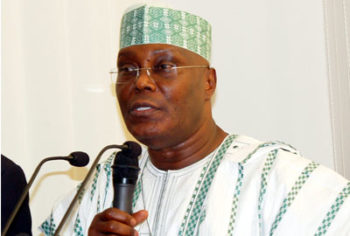 Former Vice President Atiku Abubakar on Friday said it was doubtful whether Nigeria has indeed exited recession.
Former Vice President Atiku Abubakar on Friday said it was doubtful whether Nigeria has indeed exited recession.
Abubakar made this known in his keynote address while picking the Silverbird’s 2017 man of the year award in Lagos Friday.
“Last year,” Abubakar said, “we celebrated the fact that we exited our first recession in 25 years. To me, that celebration was premature.
“After contracting for five consecutive quarters, Nigeria came out of recession in the second quarter of 2017 with a GDP growth rate of 0.55 per cent. In the third quarter, we fared better with 1.40 per cent.
“While this looks somewhat like we exited the recession, the reality is that when you factor in our population growth rate of 2.3 per cent, which is one of the highest in the world, have we really exited a recession? Technically, yes, but in reality, it is doubtful.”
The former Vice President said Nigeria is going through a lot of challenges in the area of unity, economy and security.
“These challenges are actually symptoms. They are not the ailment. And as any doctor will tell you, you cannot get genuine long-lasting relief if you treat symptoms. You have to target and treat the root cause of the disease.
“What is happening in Nigeria is that as a nation, we are caught up in a modern-day Malthusian Trap. For years, our population has been growing faster than our Gross Domestic Product, bringing us to a point where we have an ever-increasing population competing for resources that are not keeping pace with population growth.
“It may sound simplistic, but if Nigeria can assemble a leadership focused on getting us out of this Malthusian trap by gradually reversing the trend where population growth exceeds GDP growth, many of these challenges we are currently facing will slowly but surely fade away,”
In February 2018, he said, Nigeria has just overtaken India as the world’s capital of extreme poverty according to the World Poverty Clock. He argued that there are more extremely poor people in Nigeria than there are in India, a country that has six times Nigeria’s population.
“When people do not have jobs and the means to start a business are beyond their reach, they are incrementally much more likely to engage in criminal behaviours like terrorism, kidnapping, militancy and armed robbery,” he noted.
“According to the African Development Bank, in 2017, 18 African countries grew their Gross Domestic Product above 5%. Nigeria, which was number one in 2014, was not amongst these nations. We must figure out what has happened in the intervening years between 2014 and 2018 and fix what went wrong.
“What happened to brilliant initiatives like the YouWIN programme which gave Nigerian youths the training and funding to start their own businesses?”
The former vice president also argued that Nigeria needs to be restructured, in order to fix “Nigeria’s broken systems and not just a campaign gimmick that we fish out of our magic hats and deny after we have gotten what we want.”
“Let me say this: The Restructuring that I, Atiku Abubakar, envisions, will see no state receive less money from the federation account than it currently does. I hope that will ease the anxieties of some who oppose restructuring. Restructuring will not cheat you. It will free you.
“When I was in government, we reduced recurrent expenditure by introducing the monetisation policy and by privatising many government enterprises, especially those that were consuming resources without generating revenue. Those policies have been bastardized today and we have seen a ballooning of our recurrent expenditure and shrinkage of our capital expenditure. We must return to the basics.”
Abubakar noted that the nation cannot spend 70 per cent of its budget on recurrent expenditure at a time Nigeria has more unemployed or underemployed people than the entire population of the Republic of Cameroon.
He said, “Many of you in the audience and those of you watching from home may be surprised to know that when I was a teenager, the Saudi Royal Family came to Nigeria for medical tourism and precisely to the University College Hospital, Ibadan.
“Can you imagine how I feel that now that I am an adult, Nigerians, and especially our leaders, are Africa’s number one medical tourists.
“We have to enact laws to prevent leaders from diverting public funds from the public health sector to the treatment of the elite in the best hospitals abroad. If you can afford it from your own private resources, then pay for it. But do not make the tax payer pay for it.
“We are in critical times, and as I conclude, I want to urge a paradigm shift in Nigeria. Our elite are treated in Europe. Big Brother Naija is being broadcast from South Africa and Nike is unveiling our FIFA World Cup Jersey in London. Is this the extent to which we have outsourced Nigeria? As far as I am concerned, if it concerns Nigeria, it must be done in Nigeria, not abroad. Not abroad.”
On the security around the country, the former vice president said he feels the pain of the people of Borno, Benue, Taraba, Adamawa, Plateau, Kaduna and now Zamfara, saying it is time to end the killings.
“I feel your pains on the recent deaths you have suffered and the time has come for all Nigerians to say together, no more. These senseless killings must end,” he said.
Copyright Ships & Ports Ltd. Permission to use quotations from this article is granted subject to appropriate credit given to www.shipsandports.com.ng as the source.